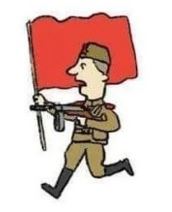The barbarian kingdoms were kingdoms founded by various Germanic, Iranian, Hunnic and other peoples, that were established all over the Mediterranean after the Barbarian Invasions from the late antiquity to the early middle ages. The term "barbarian" has been commonly used by historians. Other terms used include "Northern European kingdoms", "Romano-northern European kingdoms", and "post-Roman kingdoms".
Historically, the period of the Barbarian kingdoms spans the years from 409 to c.800. It begins in 409 with several Barbarian kingdoms being established on the Iberian peninsula, including the Kingdom of the Suebi, the Alani Kingdom, and territories of Hasdingi and the Silingi Vandals. It ends with the formation of the Carolingian Empire in Western Europe.
The Kingdoms
The most important and most successful of these kingdoms was that of the Franks. Established in the 4th to 5th century, the Frankish kingdom grew to include much of Western Europe, developing into the early medieval Carolingian Empire and ultimately the Kingdom of France and the Holy Roman Empire of the high medieval period and beyond. The Frankish Realm continued until 843, when it was partitioned. Realms resulting from this event included West Francia (predecessor of modern France), Middle Francia and East Francia (predecessor of modern Germany).
Other major kingdoms included those of the Visigoths and Ostrogoths; both were established in the 5th century. The Ostrogothic kingdom was re-conquered by the Eastern Roman Empire in the 550s, while the Visigothic kingdom survived into the 8th century, but finally fell to the Muslim invasion of Hispania. The kingdoms of the Burgundians and of the Suebi were established in the early 5th century, and fell to the Franks and the Visigoths, respectively, in the 6th century.The Alemannic Kingdom was established in the 3rd century; it became a duchy subject to the Franks in 496, although this overlordship was at times nominal and Alemannia remained semi-independent until the 8th century. The Vandal Kingdom existed in Africa and Sicily from 435 until 534. The romanized berbers established the Mauro-Roman Kingdom and other minor polities in Africa, lasting until the Muslim conquest.
Various Anglo-Saxon kingdoms existed in medieval England, after a mass settlement in the area. The Romano Britons and various celtic peoples established their own kingdoms in the same period all over Britain, Brittany and Ireland.
In Pannonia, the Huns established a short lived nomadic empire ruled by Attila. After them, the Gepids dominated the area. Finally another nomadic group, the Pannonian Avars established another nomadic empire in 567, lasting until the 9th century.
Another wave of barbarian invasors founded new kingdoms in the 6th century: The Kingdom of the Lombards in Italy was established in the 6th century and conquered by the Franks in 774. The Nomadic Bulgars established the First Bulgarian Empire in Thracia in 687. Meanwhile various Slavic groups like the Sclaveni and the Antes founded petty kingdoms in the Balkans in the same period.
Historical/Historiographical Significance
The barbarian kingdoms marked the transition from Late Antiquity to the Early Middle Ages in the 6th and 7th centuries, gradually replacing the Roman system of government on the lands of the Western Roman Empire, notably in the two western prefectures of Gaul and Italy.
These kingdoms were foederati of the Roman Empire, and even after the fall of the Western Roman Empire in AD 476 they continued to at least nominally consider themselves subject to the Eastern Emperor. These historical ties with the empire were weakened in the later 6th century, with the loss of much of the western possessions of the empire under Justin II and the waning power projection by the empire, weakened by its wars with the Persians and the Arab invasion.
As a result, the "barbarian kingdoms" by the 7th to 8th centuries developed the system of feudalism characteristic of the European Middle Ages. The title of "emperor" was revived in the west by Charlemagne in AD 800. At the same time, the Carolingian Renaissance developed the notion of Europe as a geopolitical entity with a history separate from that of the wider Mediterranean region.
Hey everyone, back with history posts after about a week. Part of that was being on a camping trip with family, part of it was me thinking about my future. After looking at the responses to this post of mine, though, I think I'll definitely make History my major, or at least my undergrad.
As for this post, part of the reason I made it was because I was thinking about how, when the Roman Empire is taught in school, it is not often mentioned what happened after it fell. In many ways, the post Western Roman kingdoms, to me, could be argued to be political successors to such. After all, even if material conditions may have worsened across the former territory, it's not like the land was abandoned or anything. Things like this happen when even the largest empires crumble, after all: successors will rise, sometimes from the ashes.
do not, my friends, become addicted to a stable ABI. it will take hold of you, and you will resent its absence!
So the Britons were invaded by the Romans, there the Saxons, then the Danish and finally the Norwegians and the Normans at the same time. No wonder the Celts there got subsumed and no wonder English is such a "diverse" language
They weren't entirely subsumed! Two modern nations that are Britonnic in origin are Wales and Brittany.
The Bretons are descended from refugee populations fleeing the instability and violence in Britain, settling in what is now northwestern France. Their language is Celtic, but an Insular (from the British Isles) language rather than a Continental language like the Gauls that preceded Roman control of the region.
The Welsh are descendants of the Britons. The name Wales is actually Germanic in origin - Wealh, or Wēalas in Old English, and was a term used to describe Romans. This same word is where we get the names for Wallonia (region in Belgium), and Wallachia (region in Romania).
Interestingly, English actually has very little influence from Celtic languages, in large part because of the stigma against Celts in Anglo-Saxon society. Because of that, the vast majority of Celtic words in English are place names, though some words, such as bucket, gob, noggin, truant, and gaol (or jail) do come from celtic origin.
Britons, specifically celtic-speaking Britons, do have a history in what is now England much later than people realize. Records talk of Briton slaves being commonplace in Anglo-Saxon England. In the Domesday Book, a sort of census taken by the Normans in 1088, roughly 10% of England's population were slaves, many of them Britons, as Saxons frowned upon taking fellow Saxons as slaves.
ahh, cool, knew the Bretons in Brittanny were Celtic in origin but I didn't know they actually came from Britain, actually makes sense given the name. The more you know!
This is a really interesting time period that I'd like to learn more about, but I'm focusing my reading on later modern politics and economics.
To what extent were these tribes the modern people of Europe? Like, could you consider the Franks the first French people, or the proto-French or whatever. The line between people of a nation and tribes is very confusing to me.
Also, how different were they? From the very little history I know of the time period, the barbarians all came in a similar timespan, from... somewhere. Actually, where did they come from? They weren't natives right, that was the celts and later the Romans. So did they just appear?
Also unrelated to that, were the barbarians the start of feudal society, or did they adopt it? Or did it just develop similarly across Eurasia?
Lot of differing questions that one can go deep into, I'll try to answer best I can.
To what extent were these tribes the modern people of Europe?
Mostly for many non-Slavic groups (their predecessors migrated in a bit later), yes, they can be considered precursors in a rough sense, if we're going to be generous. Latin influences in the former Roman territories and from the Church also had an influence.
Also, how different were they?
The Alemanni, Suebi, Franks, Saxons, Lombards, and Burgundians were all, er, germanic (not to sound like a nazi). The Ostrogoths and Visigoths "emerged from the Gothic tribes, most likely a derivative name for the Gutones, a people believed to have their origins in Scandinavia and who migrated southeastwards into eastern Europe". They also could be considered roughly Scandinavian. (Fun fact, Beowulf would have lived in the area the Gutones came from)
Further migrators would be the early Slavs, the Bulgars, and the "Pannonian Avars" (no one really knows where the latter came from)
From the very little history I know of the time period, the barbarians all came in a similar timespan, from… somewhere. Actually, where did they come from? They weren’t natives right, that was the celts and later the Romans. So did they just appear?
They all roughly migrated from their homes outside the Empire's territory, in a period of time known as the Migration Period, mainly during the First Wave. Relevant Wiki Article. The main cause(s) of the Migration are generally regarded to be the invasion of Attila the Hun in 375, with the later ongoing destabilization of the Western Roman Empire later prompting further migrations. Later on, climate shifts, which had started in 150 AD and would intensify with the Late Antique Little Ice Age
Also unrelated to that, were the barbarians the start of feudal society, or did they adopt it?
Well that's a whole post on it's own, but to put it shortly, yeah, they sort of went along with the material trends leading to feudalism. The foundations of feudalism actually started with the destabilization of Rome; as Roman central authority waned, large landowners often decided that they would both stop sending taxes and hire troops to protect their own estates. This is often called 'manoralism' We can also see here it's brief history of its relation to feudalism:
Antecedents of the system of manoralism can be traced to the rural economy of the later Roman Empire (Dominate). With a declining birthrate and population, labour was the key factor of production. Successive administrations tried to stabilise the imperial economy by freezing the social structure into place: sons were to succeed their fathers in their trade, councilors were forbidden to resign, and coloni, the cultivators of land, were not to move from the land they were attached to. The workers of the land were on their way to becoming serfs.
Several factors conspired to merge the status of former slaves and former free farmers into a dependent class of such coloni: it was possible to be described as servus et colonus, "both slave and colonus". The Laws of Constantine I around 325 both reinforced the semi-servile status of the coloni and limited their rights to sue in the courts; the Codex Theodosianus promulgated under Theodosius II extended these restrictions. The legal status of adscripti, "bound to the soil", contrasted with barbarian foederati, who were permitted to settle within the imperial boundaries, remaining subject to their own traditional law.
As the Germanic kingdoms succeeded Roman authority in the West in the fifth century, Roman landlords were often simply replaced by Germanic ones, with little change to the underlying situation or displacement of populations.
The process of rural self-sufficiency was given an abrupt boost in the eighth century, when normal trade in the Mediterranean Sea was disrupted. The thesis put forward by Henri Pirenne supposes that the Arab conquests forced the medieval economy into even greater ruralisation and gave rise to the classic feudal pattern of varying degrees of servile peasantry underpinning a hierarchy of localised power centers.
So, yeah
Or did it just develop similarly across Eurasia?
Well, keep in mind that "feudalism" is a massive oversimplification of often very complex systems of labor relationships and obligations that had a lot of different names depending on the region of Eurasia, and these systems more often that not developed independently of each other. But yeah, there were some similarities in its creation.
Hope this answers your questions!
Interestingly I think the Huns were supposed to have migrated all the way from China/Mongolia (over generations) and from the same people that were ancestors to the Mongols.
If you're talking about the Xiongnu-Hun connection, then I think that that hypothesis has fallen out of favor among a lot of scholars
Is visi and ostro connected to west/east, or am I misremembering?
Also, I would suspect they became relatively more prosperous without giant leech of rome on top of them tbh
Visi- is west, Ostro- is east (in relation to where they settled, though, not from where they originated)
What are your thoughts on the Pirenne Thesis? I think it overstates the effects of the Arab conquests on European trade, but the core idea that Rome never fell makes sense to me, and I can be annoying and contrarian about it.
Reading it, my initial thoughts are that, from a Marxist, materialist conception of history, the part of the merchants, aka the early bourgeois forming an early domination of the new cities is pretty interesting.
I was just reading Samir Amin’s Global History: A View From the South and he (very much a Marxist) had some thoughts. I wasn’t familiar enough with Pirenne beforehand so I can’t tell if he entirely disagrees with Pirenne or if he just disagrees with only a portion, but it was mentioned in the intro chapter for a good couple paragraphs.
It has been a super interesting read so far. He views Barbaric Europe as a peripheral zone of the ancient world system (not unlike how we view many African, Asian, or South American states today), compared to the much more developed states in China, India, and the Mediterranean.
He also argues that Europe, developing much later than these civilization centers, was in a good position to really embrace the proto-capitalist aspects of Eastern states, as it left the communal phase of civilization.
I think the book is gonna be Arrighi on steroids, albeit a bit more speculative. However I’ve heard Amin give several lectures and he was a fucking smart dude, so I’m super interested to see his thoughts on global history laid out in book form.
its also interesting period because as history becomes murky and thereby mystical again constituting therefore the 'Heroic Age' for Many European Nations (King Arthur / Nibelungen etc..
The Song of the Nibelungs is very interesting as it could be mostly reconstructed its basicly 3 seperate Stories that with time where woven into each other ...
The killing of the Dragon and the Invisible Cloak are attributed to the Arminius Story (Teutenburg Battle) as is the Name of the Protagonist 'Siegfried' (we know only the Roman name "Arminius" But all his Brothers where named Siegurd Siegold etc. also the Dragon is seen as the Roman Army - Armored / Laden with Gold / Defeated in the Forest / By an Invisible Cloak (Arminus was a roman Soldier turned Traitor )/ and of course the Draco itself of course .. every Cohort would carry such an Standard
Second Part is then Aetius and his Hunnic Foederati (Etzel = Attila) Destroying the Burgundians (actually Resettle them you know where ) in 436
And the Last Piece about Brunhilde which is a derived from the last queen of the Merowing Dynasty Brunichild which also ended another Incarnation of the Burgundian Realm (Burgundians never make it) along with her Dynasty. . .
In a time without writing all of it flows together towards a Imaginged Mystical Heroic Age ... Like the Greek Heroic Age there are also crossovers and stuff (Dietrich von Bern etc. ) its super interesting
Also Fascist simp for it so its good to have better knowledge on it then they do ...
Huh, never heard of that analysis, but it actually is pretty cool, looking at it that way.
one takeaway , Burgundians never last long
https://en.wikipedia.org/wiki/Charles_the_Bold
While i think the US might decentralise, i dont think it will fully balkanise like this, at least not in the contiguous continental states.
The end result might resemble the Holy Roman Empire rather than the Late Roman Empire.
bringing christianity to the Barbarians and Savegaurding a Bunch of Books , MVP of this hole era
But they need to do the first Bit for the Second Bit to be possible





